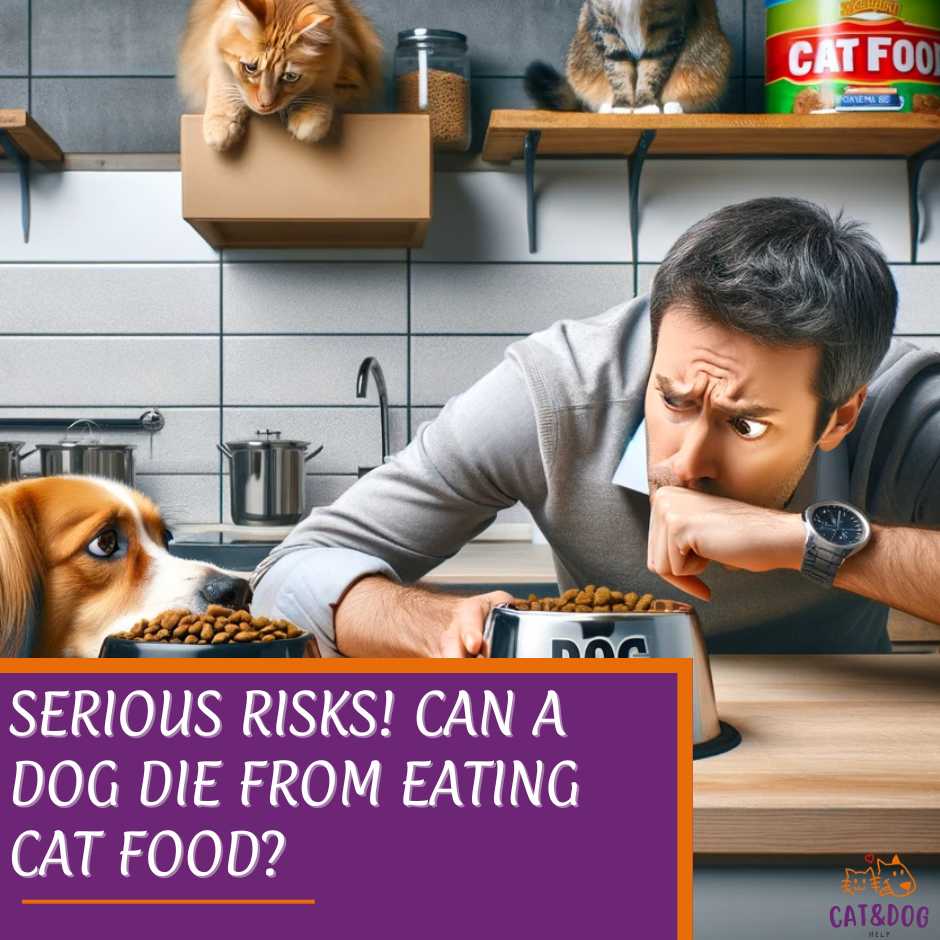Ever caught your furry friend sneakily munching on the cat’s dinner? It’s a common scene for those of us with both dogs and cats in the family.
Your pooch might seem pretty pleased with their stealthy snack, but as a responsible pet owner, you’re probably asking yourself: can this cause any harm?
While dogs have a knack for wanting to eat just about anything, cat food is formulated specifically for felines, not canines. The good news is that it’s relatively safe if your dog accidentally eats cat food.
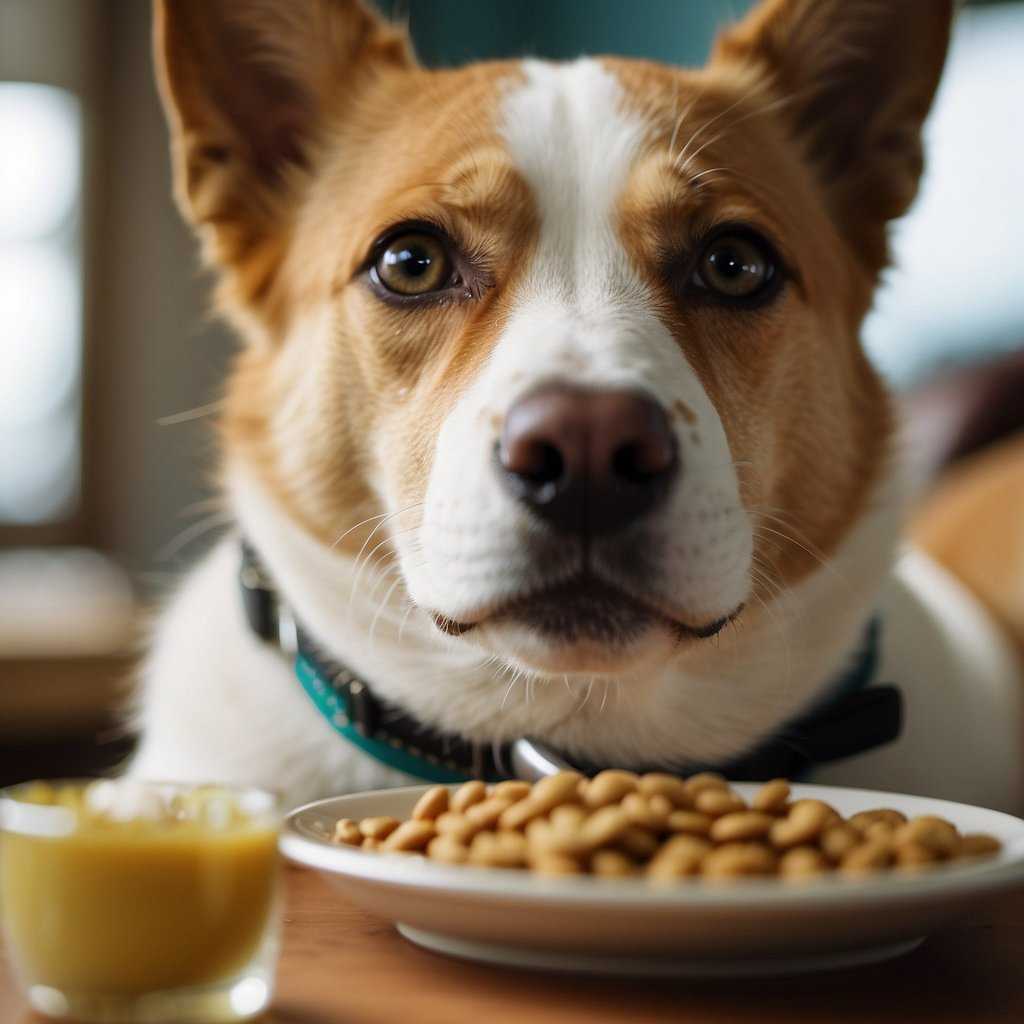
Understanding the differences between what’s nutritionally appropriate for dogs versus cats is crucial for maintaining a dog’s digestion and overall health. (1)
Cat food is typically higher in protein and fat which might sound like a tasty treat for your dog, but it’s not engineered to meet their unique dietary requirements. (2)
Eating cat food occasionally might not spell disaster, but it becomes a cause for concern and significantly affects a dog’s health when they eat cat food over an extended period.
Eating cat food can cause myriad health issues for a dog, such as pancreatitis, obesity, and gastrointestinal upset, among others. Let’s not turn this into a catastrophe and find out what the risks to digestion are. (3)
Key Takeaways
- Occasional nibbling on cat food typically isn’t fatal for dogs.
- Canine and feline diets are different; cat food doesn’t meet all of a dog’s nutritional needs.
- Consult a vet if your dog regularly raids the cat’s bowl or shows any health issues.
Can a Dog Die from Eating Cat Food?
Ever wondered if a sneak peek into the cat’s bowl could spell trouble for your pooch? Let’s chew over, quite literally, what cat food could mean for your dog’s health. (4)
Nutritional Differences Between Dog and Cat Food For starters, you should know that cat food packs a punch with higher protein and fat content than dog food.
Why does this matter? Cats are obligate carnivores, thriving mainly on meat. Dogs, though, are more like us, flexible omnivores needing a varied diet. (5)
Here’s what sets them apart nutritionally: Cats and dogs have different dietary requirements. Cats are obligate carnivores, which means that cats must eat meat. (6)
It’s a biological necessity. Dogs, contrary to some beliefs, are omnivores, which means they eat meat and vegetables, so they need a more varied diet than just meat alone to meet their nutritional requirements.
Additionally, cat food might be more tempting for dogs to eat because the meat smell and flavor are a lot stronger than their food.
- Protein: Dog food has enough protein for your dog’s diet, while cat food often goes above and beyond. (7)
- Fat: Dog meals usually have less fat than cat food. (8)
- Essential Nutrients: Amino acids like taurine and arachidonic acid are already produced by dogs, but cats need them from their food.
A scoop of kitty’s meal on occasion likely won’t send your canine companion to the doghouse health-wise, but regular dining could lead to trouble.
Short-term Effects of Dogs Eating Cat Food Yes, once in a blue moon, your dog nabbing a bite of cat chow isn’t catastrophic, but keep your eyes peeled for these signs:
- Diarrhea and vomiting: Not the best way for your dog to show appreciation for that feline feast!
- Allergic reactions: Some dogs might have immediate negative responses.
When pancreatitis, liver, or kidney issues are in the picture, blame the fat and protein overload from cat food.
If you notice Rover raiding Whiskers’ stash often, a chat with a veterinary nutritionist or an emergency vet may be in order. After all, you want the tail-wagging without the bellyaching, right?
Keep those dietary requirements in check for your four-legged friend.
Risks of Dogs Regularly Eating Cat Food
Ever wondered what might happen if your four-legged buddy makes a habit of snacking on your cat’s food?
While the occasional nibble might not seem like a big deal, regularly feasting on feline fare can lead to some serious health issues for dogs.
Long-term Health Risks
First off, cat food is formulated specifically for the nutritional needs of cats, not dogs, which can lead to nutritional imbalances.
Dogs feeding on cat food may end up with too much protein and fat, and not enough of the other nutrients they need.
Over time, this can contribute to obesity, a tricky issue that can sneak up on your pup.
Obese dogs face a higher risk of health conditions like weight gain and obesity in some dogs, while the higher fat would also be an issue for dogs predisposed to pancreatitis.
- Joint issues
- Heart disease
- Diabetes
Studies have shown that an improper diet can have various negative long-term effects on dogs’ health.
Specific Dangers to Watch For
Your pup’s digestive system is also at stake. Indulging in cat food could lead to pancreatitis and gastrointestinal upset. Keep an eye out for:
- Vomiting
- Diarrhea
- Stomach pains
Veterinarians also warn that serious health complications can arise when dogs consistently dip into the cat’s bowl.
If your furry friend shows any signs of distress after eating cat food, it would be wise to consult with your vet.
So, in the spirit of keeping your pup’s tail-wagging and healthy, it’s probably best to stick to dog-specific chow. Remember, good health starts with the right food!
Serious Health Implications
Ever wondered if sneaking your pooch some of Kitty’s chow could lead to a tail-wagging tragedy?
While a single nibble of cat food won’t ring alarm bells, frequent feasting on feline fare is a game of Russian roulette with your dog’s health.
Why the alarm? Simply put, the nutrient profile of cat food doesn’t align with your dog’s dietary requirements. Let’s dig into the gritty details:
- Pancreatitis can bulldoze its way into your dog’s life due to the high-fat content in cat food.
- Obesity sneaks up like a stealthy cat, considering those extra calories are not suited for most dogs’ less active lifestyles.
- Liver and kidney damage? Yep, the overabundance of proteins makes the liver and kidneys work overtime.
But can a dog die? Severe cases might lead to life-threatening issues, especially if chronic conditions slip into the picture. It’s ultra-rare, but not outside the realm of possibility.
Chronic Health Issues from Regular Consumption
Indulging in cat cuisine over the long haul? That’s when trouble starts to purr ominously. Chronic conditions don’t just appear; they creep in silently over time. Here’s the lowdown:
- Liver Problems: Protein overdose puts the liver on the front line.
- Kidney Workload: Cats can handle the protein punch; dogs, not so much.
Clinical studies and documented cases make it clear—these organs can only take so much before they wave the white flag.
Have you heard of dogs turned regular cat food critics experiencing these woes? Statistically speaking, while the numbers aren’t huge, each case is a pawprint on the path to awareness.
Serious health implications? Absolutely. A guaranteed one-way ticket to doggy heaven? Unlikely—but why risk it, right?
When to Seek Veterinary Care?

Hey there, pet parents! It’s super important to know when a sneaky snack turns into an emergency. Here’s the lowdown on when to hustle over to the vet:
- Severe Vomiting: If your furry friend starts doing their best impression of a fountain, and it doesn’t stop, this is a red flag.
- Lethargy: Should your usually zoomy pal be more slug than dog, something’s up.
- Difficulty Breathing: Is Fido panting like he just ran a marathon, but he’s been on the sofa all day? That’s not good.
Should you see these signs, don’t wait around asking Dr. Google what to do – get to a vet pronto. If it’s after hours, beeline to that emergency clinic.
Now, let’s chat about diets. Trust your vet to guide you on what’s tasty and right for your pooch’s sensitive stomach.
Every dog is different, and some might need special chow to avoid a dietary “oops.” If switching foods, do it slow, mix the old with the new, and watch your doggo for any funny business as they adjust.
Remember, you’re the frontline defense in keeping tails wagging safely! Keep cat food out of snout’s reach and stick to the good stuff tailored just for dogs.
It might not be as thrilling as sniffing out cat cuisine, but it’s better for their health in the long run. Consider placing your cat’s food bowl higher up and out of your dog’s reach, and your dog will thank you for it!
Making these small changes can go a long way toward preventing your dog from accidentally eating cat food, or vice-versa, and reduce the chances of any resulting pet vomit messes.
Preventing Accidental Cat Food Consumption
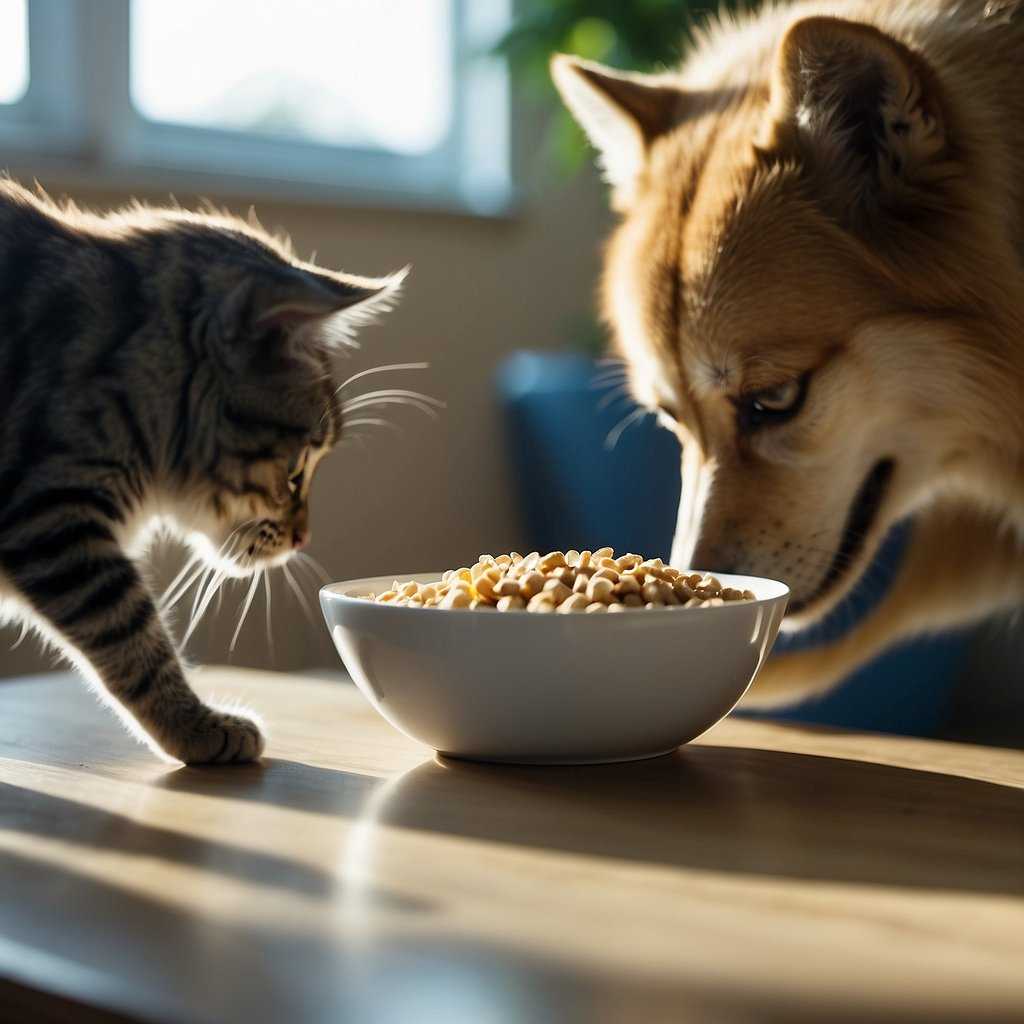
Practical Tips for Multi-Pet Households
Hey there, multi-pet parents! You know the struggle of keeping your canine’s curious snout out of the cat’s dinner. Let’s talk strategy:
- Feeding Zones: Ever considered mealtime zoning? Assign separate feeding areas for your dog and cat. It’s like having VIP sections at a club, but for eating!
- Cat’s area: Elevated spaces or rooms with pet gates.
- Dog’s area: Another room or a designated spot away from the cat’s sight.
- Timed Feeding: What about synchronized feeding watches? Serve your pets at different times to prevent crossover snacking. A routine will make your life easier—trust me.
Pet-Proof Containers
- Got a dog with a PhD in food theft? Try pet-proof containers—the Fort Knox for pet foods. Store cat food in containers that are tricky for your furry Houdini but easy for you to handle. Check out containers with locks or complicated lids.
Alternative Solutions for Curious Dogs
Training. Toys. Two powerful Ts to tackle the temptation:
- Obedience Training: Teach your dog commands like “leave it” to resist cat cuisine. Positive reinforcement works wonders!
- Engaging Toys: Boredom often leads to snack explorations. Keep your doggo busy with toys or puzzle feeders. They’ll barely remember the cat food exists.
Remember, it’s all about keeping them happy, healthy, and away from each other’s bowls. Good luck!
Quick Recap
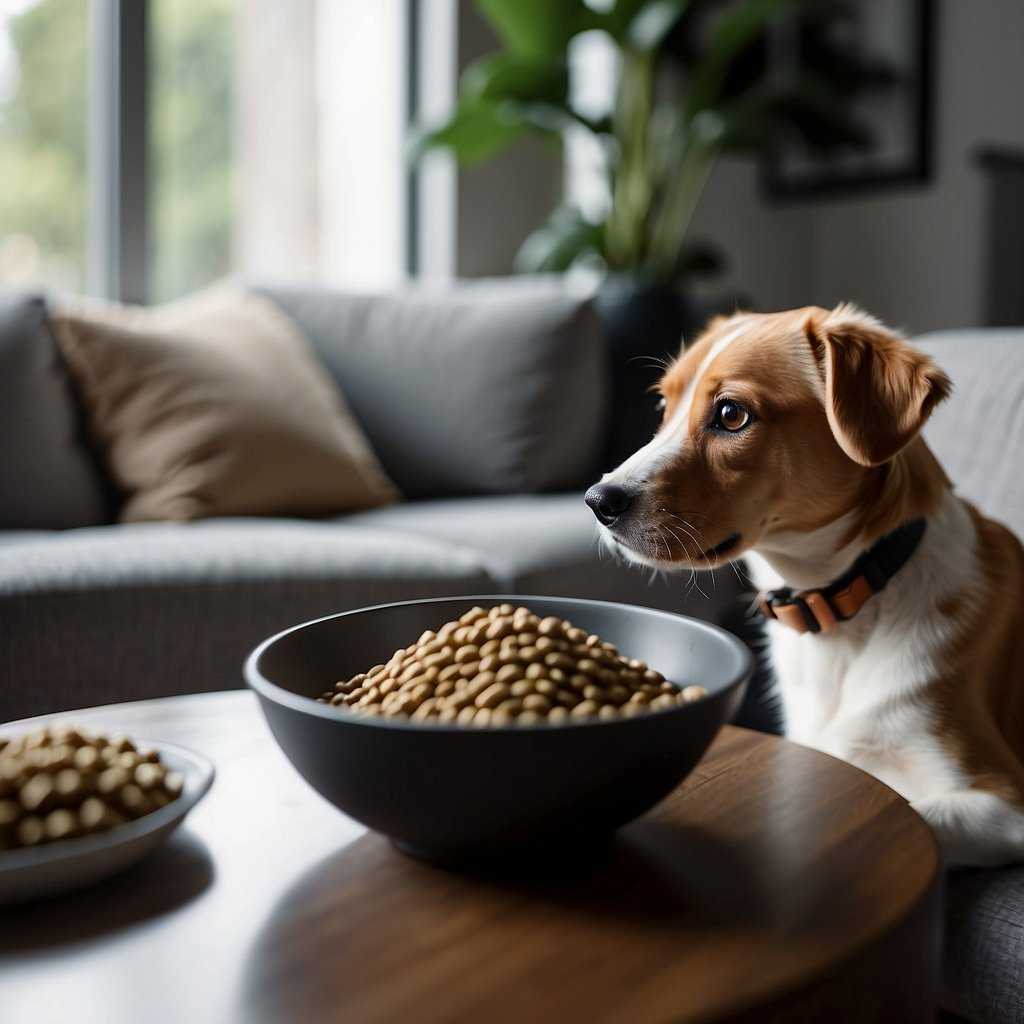
Have you ever caught your dog sneaking a bite of your cat’s food? While it may seem harmless at first glance, regularly munching on cat food can put your pooch at risk.
Dogs have different dietary needs than cats, and cat food isn’t tailored to their nutrition.
Risks to Your Dog:
- Gastrointestinal distress: A taste now and then? Maybe just a tummy ache. But make it a habit, and your dog could face serious upset.
- Allergic reactions: Not all ingredients play nice with your dog’s system.
- Nutrient imbalances: What’s good for the cat isn’t always good for the canine.
- Obesity: Those extra fats in cat food can pack on the pounds.
- Pancreatitis: Rich and fatty, cat food can inflame your dog’s pancreas.
- Liver and kidney strain: High protein levels can overwork these organs over time.
Preventing Access to Cat Food:
- Store cat food away from canine reach.
- Feed your pets separately to avoid mealtime mix-ups.
The Takeaway: A dog’s diet should be dog-specific—full of nutrients tailored to their needs. You care about your furry friend’s health, so stick to their chow.
A sneaky bite here or there is usually not a disaster, but prevention is key. Keep an eye on your pets at meal times and secure that cat food—your dog’s health Thank you in advance!
Frequently Asked Questions
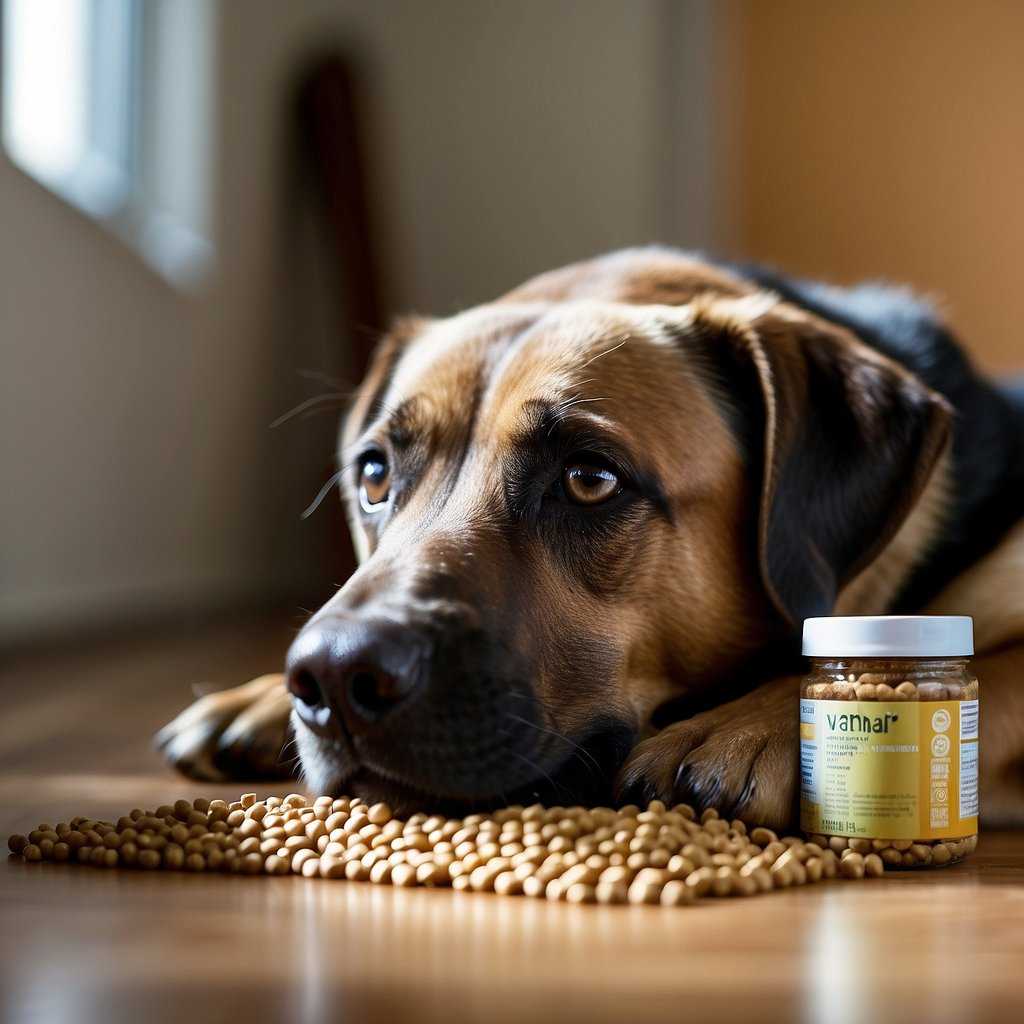
What should I do immediately if my dog ingests cat food?
If you catch your dog eating cat food, don’t panic. Remove any remaining cat food from their reach. A small amount usually isn’t harmful, but monitor your dog for any unusual behavior and consult your vet if you’re concerned.
What immediate symptoms should I look for if my dog eats cat food?
After your dog has eaten cat food, watch for signs of gastrointestinal upset, such as vomiting or diarrhea. These symptoms can often occur due to the higher protein and fat content in cat food which dogs’ stomachs may not be used to.
Can eating cat food cause long-term health problems in dogs?
While an occasional nibble of cat food is not typically dangerous, regular consumption can lead to nutritional imbalances and long-term health issues such as obesity, liver or kidney problems due to the higher protein levels.
Are there any specific breeds of dogs more at risk from eating cat food?
No breed is immune to the risks, but breeds prone to dietary sensitivities or obesity may be more at risk for adverse effects from regularly consuming cat food.
What are the risks if my dog accidentally eats wet cat food?
Wet cat food is often richer and might upset your dog’s stomach more than dry cat food. If your dog gobbles up wet cat food, they might experience a quicker onset of diarrhea or vomiting.
Could consuming cat food lead to digestive issues like diarrhea or blood in my dog’s stool?
Yes, the rich content of cat food can cause digestive issues like diarrhea. If you notice blood in your dog’s stool after they’ve eaten cat food, contact your vet immediately, as this can indicate a more serious reaction.
Can a dog develop allergies from eating cat food regularly?
Just like with any food, there’s a potential for your dog to develop an allergy if they eat cat food regularly. Symptoms of a food allergy can include itchy skin, ear infections, and gastrointestinal problems.
- Advantages of Playing Casino Online - July 6, 2025
- How players can take advantage of the no deposit bonus at the Casino - July 5, 2025

